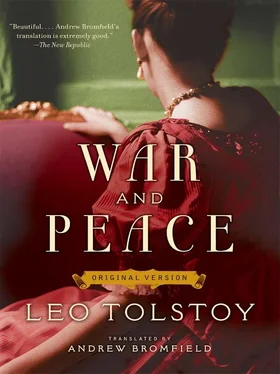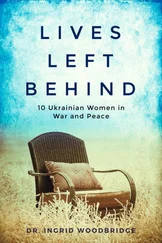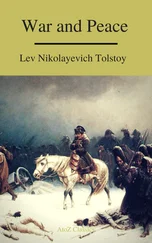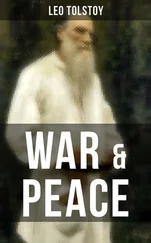Dolokhov was a young man of good family, but not rich, although he lived extravagantly and gambled constantly. He almost always won; but no one, not even in his absence, dared to attribute his constant success to anything other than good luck, a clear mind and indomitable will-power. In their hearts, everyone who gambled with him assumed he was a card-sharp, although they did not dare to say so. Now, when he had proposed his strange wager, the drunken company took an especially keen interest in what he intended to do, precisely because those who knew him knew that he would do what he had said. Pierre also knew it and that was the only reason why he greeted Dolokhov without attempting to raise any objection to his intentions.
The rest of the company consisted of three officers, the Englishman, who had been seen in St. Petersburg in the most diverse circles, and a certain Moscow gambler, a fat married man who was much older than everyone else, and yet was on familiar terms with all these young people.
The bottle of rum had been brought; the frame that prevented anyone sitting on the sloping ledge of the window was being broken out by two servants in gaiters and kaftans, who were clearly working in haste, feeling intimidated by the shouted advice from the gentlemen surrounding them.
With his chest thrust out, his expression unchanging, neither walking round the others nor asking them to make way, Anatole forced his strong body through the crowd at the window, went up to the frame, wrapped both his white hands in a frock coat that was lying on a divan, and struck at the panes of glass, breaking them out.
“Now now, your excellency,” said a servant, “you’re only getting in the way and you’ll cut your hands.”
“Get out of it, you fool, eh?” said Anatole. He took hold of the crossbeam of the frame and began pulling. Several other hands also joined in; they pulled, and the frame sprang out of the window with a crack, so that those pulling it almost fell over.
“Out with it all, or they’ll think I’m holding on,” said Dolokhov.
“Listen,” Anatole said to Pierre. “You understand? The Englishman’s boasting … eh? … National pride? … Eh? … All right? …”
“All right,” said Pierre, gazing with a sinking heart at Dolokhov as, grasping the bottle of rum in his hands, he approached the window, through which could be seen the light of the sky, where dawn and dusk were merging. Rolling up the sleeves of his shirt purposefully after sticking the bottle of rum in his pocket, Dolokhov leapt smartly up to the window.
“Listen!” he shouted, standing on the sill and addressing the room.
Everybody stopped talking.
“I wager” (he spoke in French so that the Englishman would understand him, but he did not speak that language too well) “I wager fifty imperials … Want to make it a hundred?” he added, addressing the Englishman.
“No, fifty,” said the Englishman.
“All right, fifty imperials, that I will drink this whole bottle of rum without lifting it from my lips, and that I’ll drink it sitting outside the window, on this spot here” (he leaned out and pointed to the jutting slope of the wall outside the window) “and without holding on … Right?”
“Very good,” said the Englishman.
Anatole turned towards the Englishman and, grabbing him by the button of his tailcoat and looking down on him from above (the Englishman was short), he began explaining in English what was already clear to everyone.
“Stop!” cried Dolokhov, banging the bottle against the side of the window to draw attention to himself. “Stop, Kuragin, listen. If anyone else does the same, then I pay a hundred imperials. Understand?”
The Englishman nodded, without making it at all clear whether he intended to accept this new wager. Anatole kept hold of the Englishman and even though the latter tried to convey by nodding that he had understood everything, Anatole translated Dolokhov’s words into English for him. A young, skinny boy, a life-hussar who had lost that evening, climbed up into the window, stuck his head out and looked down.
“Oooh …” he exclaimed, looking out and down through the window to the stone of the pavement.
“Attention!” yelled Dolokhov and jerked the officer out of the window. He jumped awkwardly back down into the room, tripping over his tangled spurs.
Setting the bottle on the window-ledge so it would be easy to pick up, Dolokhov climbed cautiously and carefully out of the window. Lowering his legs and wedging himself against the sides of the window with both hands, he shifted his position, settled himself, lowered his hands, moved a little to the right, then to the left and took hold of the bottle. Anatole brought two candles and set them on the windowsill, although it was already quite light. Dolokhov’s back in the white shirt and his curly head were lit up from both sides. Everybody was crowding round the window. The Englishman was standing at the front. Pierre was smiling without speaking. The old Muscovite, his face frightened and angry, suddenly pushed forward, trying to grab Dolokhov by the shirt.
“Gentlemen, this is stupidity, he’ll fall and be killed,” he said. Anatole stopped him.
“Don’t touch him, you’ll startle him, he’ll be killed. Eh? … What then? … Eh?”
Dolokhov looked round, adjusting his position and once again wedging himself with his hands. His face was neither pale nor red, but cold and angry.
“If anyone tries to meddle again,” he said, uttering each word separately through thin, compressed lips, “I’ll chuck him down there right now. It’s slippery enough to slide right off, but he interferes with his stupid nonsense … Right!”
After saying “Right!” he turned back again, lowered his hands, picked up the bottle and raised it to his mouth, tilting his head back and throwing his free hand upwards for balance. One of the servants, who had begun clearing up the broken glass, stopped in a bent-over position with his eyes fixed on the window and Dolokhov’s back. Anatole stood up straight, his eyes wide open. The Englishman pursed his lips and watched from the side. The old Muscovite fled into the corner of the room and lay down on a divan with his face to the wall. Some stood still with their mouths open, some with their hands raised. Pierre covered his face, where a faint, forgotten smile still lingered, although it now expressed horror and fear. Nobody said a word. Pierre took his hands away from his eyes; Dolokhov was sitting in the same position, but his head was tilted right back so that the curly hair at the back touched the collar of his shirt and the hand holding the bottle was rising higher and higher, shuddering with the effort. The bottle was clearly emptying and at the same time rising higher, as his head tilted back. “What is taking so long?” thought Pierre. It seemed to him that more than half an hour had gone by. Suddenly Dolokhov leaned backwards bodily and his hand began shaking nervously: this shuddering was enough to shift his whole body sitting on the steep slope. He changed position and his hands and head began to shake even more strongly from the effort. One hand was raised to grab hold of the windowsill, but then lowered again. Pierre closed his eyes and told himself that he would not open them again. Suddenly he sensed everything around him beginning to stir. He peeped: Dolokhov was standing on the windowsill, his face pale and elated.
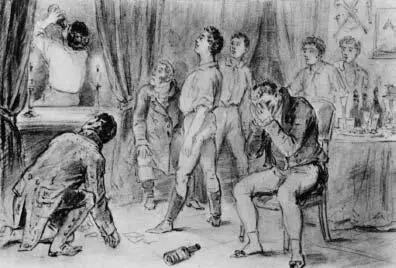
DOLOKHOV’S WAGER WITH THE ENGLISHMAN Drawing by M.S. Bashilov, 1866
“Empty!”
He tossed the bottle to the Englishman, who deftly caught it. Then Dolokhov jumped down from the window. He smelled strongly of rum.
Читать дальше
